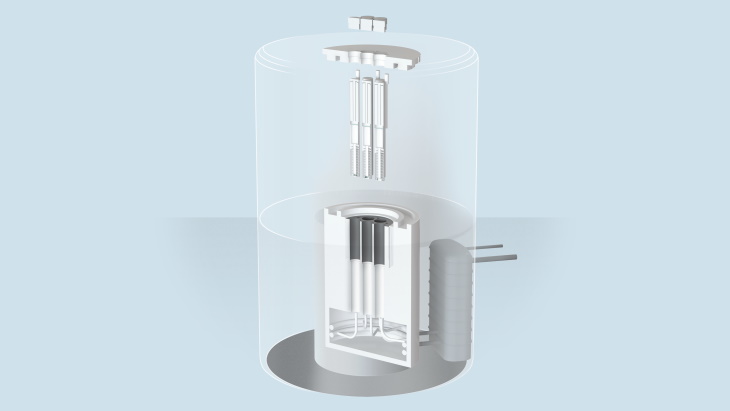
Launched by President Emmanuel Macron in October 2021, the France 2030 re-industrialisation plan is endowed with EUR54 billion (USD58 billion) in funding schemes to be deployed over five years. In February 2022, Macron said EUR1 billion will be made available through the plan for France's Nuward small modular reactor (SMR) project and "innovative reactors to close the fuel cycle and produce less waste". He said he had set "an ambitious goal" to construct a first prototype in France by 2030.
Following a call for projects, Thorizon of the Netherlands has now announced that it is being granted EUR10 million in funding under France 2030.
Thorizon - a spin-off from NRG, which operates the High Flux Reactor in Petten - is developing a 250 MWt/100 MWe molten salt reactor (MSR), targeted at large industrial customers and utilities. Thorizon aims to construct a pilot reactor system before 2035.
MSRs use molten fluoride salts as primary coolant, at low pressure. They may operate with epithermal or fast neutron spectrums, and with a variety of fuels. Much of the interest today in reviving the MSR concept relates to using thorium (to breed fissile uranium-233), where an initial source of fissile material such as plutonium-239 needs to be provided. There are a number of different MSR design concepts, and a number of interesting challenges in the commercialisation of many, especially with thorium.
The molten salt fuel adopted by Thorizon uses a combination of long-lived elements from reprocessed used nuclear fuel and thorium. The reactor will be able to recycle long-lived waste from existing nuclear facilities.
"In addition to the [France 2030] grant, the programme provides access to expertise in nuclear research, European legislation, and business development," Thorizon said. "With the subsidy, Thorizon intends to accelerate its ambition to develop a small modular reactor based on molten salt, using nuclear waste from conventional nuclear plants as an important fuel source."
Amsterdam-based Thorizon earlier this year opened a second location in Lyon, France.
"Historically, France has been the centre of nuclear expertise in the world," noted Thorizon CEO Kiki Lauwers. "It is therefore important for us to also have a physical presence there. Especially since we collaborate with the French company Orano, a recognised international operator in the field of nuclear materials, in particular through the recycling of nuclear materials into new fuel for a facility like ours. Together with them, we want to make nuclear energy more circular."
In addition to Orano, and French Alternative Energies and Atomic Energy Commission (CEA), two research institutes in Lille, French consultancy firm Oakridge, the engineering company Tractebel, NRG-Pallas in Petten, and Differ in Eindhoven are also part of the project.
Last month, Thorizon announced it had signed a strategic partnership agreement with French ultra-compact molten salt fast neutron reactor developer Naarea to advance the development of MSRs in Europe.
Meanwhile, French chloride molten salt reactor developer Stellaria - a spin-off from the CEA - has also announced funding from France 2030.
The reactor proposed by Stellaria and its partners CEA, Technip Energies and Schneider Electric will be very compact - measuring 4 cubic metres - and will be able to use a diversified range of nuclear fuels (uranium, plutonium, MOX, minor actinides, even thorium). The reactor, which Stellaria says is "the world's first fast neutron reactor capable of renewing 100% of its fuel in its core during operation" - will produce 250 MWt/110 MWe.
It said the consortium with Orano "enables the necessary acceleration of synchronised R&D between fuels and reactors".
Together with its partners, Stellaria aims to commission its first reactor in 2033, and series reactors as early as 2035.